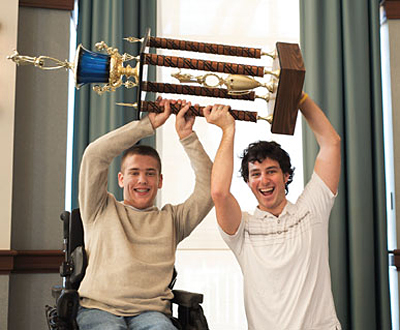 UNDEBATABLE SUCCESS: With national victories to its credit, Rochester’s Debate Union—represented by the team of Benjamin Fultz ’11 (left) and Jason Gershowitz ’09—takes on international competition.
UNDEBATABLE SUCCESS: With national victories to its credit, Rochester’s Debate Union—represented by the team of Benjamin Fultz ’11 (left) and Jason Gershowitz ’09—takes on international competition.When Jason Gershowitz ’09 was growing up in Baltimore, his parents told him he’d be a good lawyer. So when he arrived at Rochester, the freshman decided to test the idea, registering for a debate course.
“I loved it,” he recalls. “And I joined the Debate Union.”
Teammate Benjamin Fultz ’11, of Athens, Ohio, tells a similar story. His high school didn’t have a debate team, but as a freshman he took a class with Ken Johnson, Rochester’s Debate Union coach, and was hooked.
“I’m a very competitive person,” says Fultz, who has cerebral palsy and debates from a wheelchair. “I think that’s why I do it.”
Many universities recruit students skilled in high school debate to fill their teams, but Rochester takes a more inclusive approach, allowing any interested undergraduate to participate. Rochester now boasts one of the largest debate unions in the country.
“The debate team has been around as long as the University has,” says Johnson. Even a little longer: Rochester’s first forensics society was established two days before the University’s founding in 1850.
This year, the Debate Union decided to take on a whole new style of competition: parliamentary, or world, debate. As the fall semester came to a close, Gershowitz and Fultz were preparing to represent Rochester in the team’s first international tournament: the 29th World University Debating Championship, hosted by University College Cork, in Cork, Ireland.
It’s a switch from national tournaments, in which competitions are based on a style called policy debate. At the beginning of the school year, students receive a topic—this year, federal agricultural subsidies—that they research and debate for the duration of the competitive season.
For the international competition, Rochester debaters collaborated with rival teams such as Cornell University and the University of Vermont to practice parliamentary debate.
It’s a fast-moving, high-pressure form. Teams have only 15 minutes to prepare for the debate, and no advance notice of the topic. Each competition involves four teams of two—two teams representing the “government” position, and two, the “opposition.” In a particularly challenging twist, Johnson notes, the second team to speak for each side must bolster the first team’s arguments, even if they are not assertions the second team would have chosen to make.
“World debate has been an unbelievable experience for me,” says Gershowitz, a political science major who attracted standing-room-only crowds at national tournaments with his self-styled hip-hop form of debating. “I have a performance background, so it gives me a chance not only to provide clear, powerful, logical arguments, but also to present those arguments in a persuasive manner.”
For the Cork tournament, more than 1,000 participants from 41 countries gather for what is the largest academic tournament in the world.
Preparing for the tournament in Cork required a full measure of determination from Gershowitz and Fultz, who readied themselves by studying global current events as well as broadly philosophical subjects such as human rights and justice.
Nevertheless, Fultz and Gershowitz haven’t lost sight of the pleasure in argumentation that drew them to debate in the first place.
“I think you have to have a good mix of light-heartedness and seriousness,” Fultz says. “When you have a team that doesn’t look like it’s enjoying itself, that shows in the results.”
To Johnson, however, the team has already earned a victory in taking on this new form of debate.
“Debate takes everything you learn as a student and gives you a chance to apply that learning in competition,” he says. “So our success is the University’s success.”
